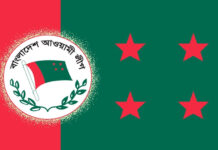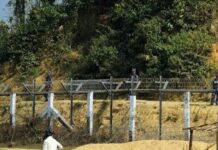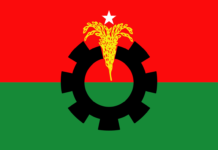The border forces of Bangladesh and India on Tuesday retreated from their earlier decision for joint investigation into border killings and decided for joint spot verification of such incidents.
‘Both sides agreed to conduct joint spot verification and appraisal on major incidents or killing in the bordering areas of Bangladesh and India which will go a long way to reduce the differences of opinion or understanding regarding any major incidents,’ read the joint statement.
The joint statement was read out at a joint press conference at the border guards headquarters in Dhaka after the conclusion of the five-day 44th director general-level border conference between the Border Guard Bangladesh and the Indian Border Security Force.
Replying to a query, border guards director general Major General Abul Hossain said, ‘We understand that the authority of investigation is vested with the police and that’s why BSF do not have authorities to investigate the incident….We can to go the to the spots to see what happened and discuss ourselves.’
Bangladesh officials said the Indian border force told the border conference that they could go for no joint investigation into incidents in borders but for joint verification of the incidents.
‘We agreed with BSF because it was not easy task to start. Basically, our home ministry can initiate the move to conduct joint investigation,’ another delegation member told New Age when the official was asked why then the both sides had agreed joint investigation in 2016 meeting.
According to border guard officials, the decision for joint investigations into border killings was finalised at the 42nd director general-level talks between the two border forces in Dhaka on May 16, 2016 after schoolboy Shehab Uddin, a resident of Goalpara in Chuadanga, was shot at point-blank range on May 14, 2016.
They said that they had drafted a form for the ‘joint investigation’ which, BSF said, was yet to be approved by the Indian home ministry.
More than 28 Bangladeshi civilians had been shot dead by BSF since the 42nd border talks held in May 2016.
In the latest meeting, BSF chief KK Sharma led a 19-member Indian delegation to Dhaka to jointly chair the 44th Border Conference began formally on February 19 and ended on Tuesday. Major general Abul Hossain led the 26 member Bangladesh delegation.
The border guard chief, however, expressed grave concern over the incidents of firing at and killing of Bangladeshi nationals and emphasized on the need for bringing the death toll to zero through cautioning BSF soldier and sensitising Indian nationals.
The BSF chief said that the non-lethal strategy proved extremely successful in reducing deaths in the border.
‘It has also resulted in an alarming increase in incidents of attacks BSF personnel by the criminals on,’ he claimed.
He further stated that BSF personnel fired with non-lethal weapon only in self-defence.
BSF chief sought cooperation of border guards in stopping Bangladeshi nationals from crossing the border.
BSF chief sought cooperation from border guards for the destruction of reported hideouts of Indian insurgent groups in Bangladesh.
The border guard chief, however, dismissed the allegation of having any hideout inside Bangladesh.
Both sides agreed to take effective steps to prevent human trafficking and illegal crossing, enhance joint capacity building of personnel from either side, share of information regarding organised criminal activities and increase surveillance in areas vulnerable to crimes in the borders.
‘In this regard, mapping of areas vulnerable to trans-border criminal activities will be updated as and when required and before each DG-level talks,’ the border guard chief said.
BSF chief said that the construction of the effluent treatment plant inside India at Agartala and related drainage with box culvert at Akhaura inside Bangladesh territory would start soon to reduce environmental hazard in the affected area.
‘At the same time, it will become a place for tourist attraction and joint retreat ceremony,’ he said.
He requested to expedite verification of nationality for early repatriation of Bangladeshi nationals found in Indian Jails or correction homes.
The border guard chief requested BSF to send correct names, addresses and other information of victims, so that concerned authority can verify their nationality.
Both the border forces decided to approach their concerned ministries to increase the number of ‘border haats’ and promote ‘border tourism’ which would help improving socio-economic condition of the bordering people.
BSF said that they were willing to send instructors to train border guards on yoga in Bangladesh. Both sides agreed to hold the next director general-level conference in New Delhi in the first week of October.
‘Both sides agreed to conduct joint spot verification and appraisal on major incidents or killing in the bordering areas of Bangladesh and India which will go a long way to reduce the differences of opinion or understanding regarding any major incidents,’ read the joint statement.
The joint statement was read out at a joint press conference at the border guards headquarters in Dhaka after the conclusion of the five-day 44th director general-level border conference between the Border Guard Bangladesh and the Indian Border Security Force.
Replying to a query, border guards director general Major General Abul Hossain said, ‘We understand that the authority of investigation is vested with the police and that’s why BSF do not have authorities to investigate the incident….We can to go the to the spots to see what happened and discuss ourselves.’
Bangladesh officials said the Indian border force told the border conference that they could go for no joint investigation into incidents in borders but for joint verification of the incidents.
‘We agreed with BSF because it was not easy task to start. Basically, our home ministry can initiate the move to conduct joint investigation,’ another delegation member told New Age when the official was asked why then the both sides had agreed joint investigation in 2016 meeting.
According to border guard officials, the decision for joint investigations into border killings was finalised at the 42nd director general-level talks between the two border forces in Dhaka on May 16, 2016 after schoolboy Shehab Uddin, a resident of Goalpara in Chuadanga, was shot at point-blank range on May 14, 2016.
They said that they had drafted a form for the ‘joint investigation’ which, BSF said, was yet to be approved by the Indian home ministry.
More than 28 Bangladeshi civilians had been shot dead by BSF since the 42nd border talks held in May 2016.
In the latest meeting, BSF chief KK Sharma led a 19-member Indian delegation to Dhaka to jointly chair the 44th Border Conference began formally on February 19 and ended on Tuesday. Major general Abul Hossain led the 26 member Bangladesh delegation.
The border guard chief, however, expressed grave concern over the incidents of firing at and killing of Bangladeshi nationals and emphasized on the need for bringing the death toll to zero through cautioning BSF soldier and sensitising Indian nationals.
The BSF chief said that the non-lethal strategy proved extremely successful in reducing deaths in the border.
‘It has also resulted in an alarming increase in incidents of attacks BSF personnel by the criminals on,’ he claimed.
He further stated that BSF personnel fired with non-lethal weapon only in self-defence.
BSF chief sought cooperation of border guards in stopping Bangladeshi nationals from crossing the border.
BSF chief sought cooperation from border guards for the destruction of reported hideouts of Indian insurgent groups in Bangladesh.
The border guard chief, however, dismissed the allegation of having any hideout inside Bangladesh.
Both sides agreed to take effective steps to prevent human trafficking and illegal crossing, enhance joint capacity building of personnel from either side, share of information regarding organised criminal activities and increase surveillance in areas vulnerable to crimes in the borders.
‘In this regard, mapping of areas vulnerable to trans-border criminal activities will be updated as and when required and before each DG-level talks,’ the border guard chief said.
BSF chief said that the construction of the effluent treatment plant inside India at Agartala and related drainage with box culvert at Akhaura inside Bangladesh territory would start soon to reduce environmental hazard in the affected area.
‘At the same time, it will become a place for tourist attraction and joint retreat ceremony,’ he said.
He requested to expedite verification of nationality for early repatriation of Bangladeshi nationals found in Indian Jails or correction homes.
The border guard chief requested BSF to send correct names, addresses and other information of victims, so that concerned authority can verify their nationality.
Both the border forces decided to approach their concerned ministries to increase the number of ‘border haats’ and promote ‘border tourism’ which would help improving socio-economic condition of the bordering people.
BSF said that they were willing to send instructors to train border guards on yoga in Bangladesh. Both sides agreed to hold the next director general-level conference in New Delhi in the first week of October.









